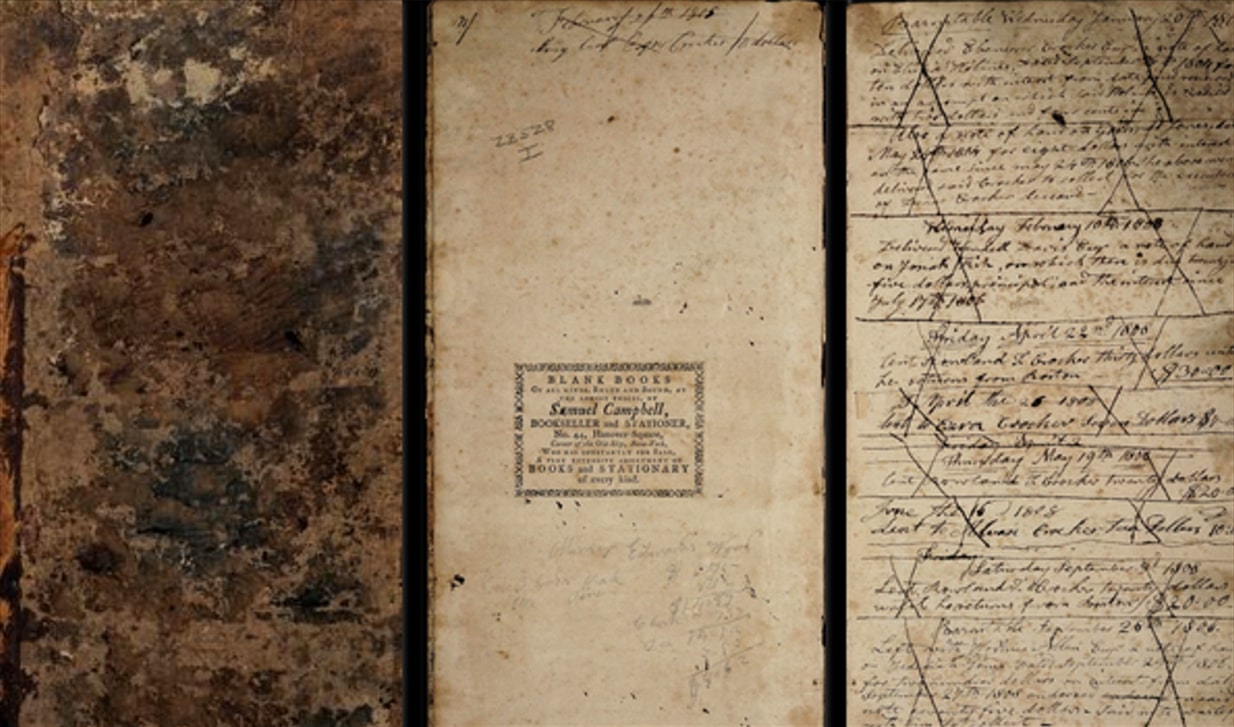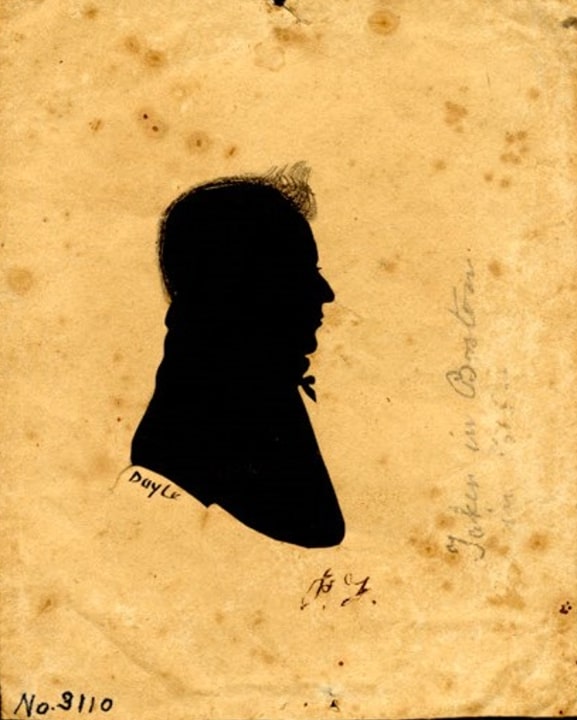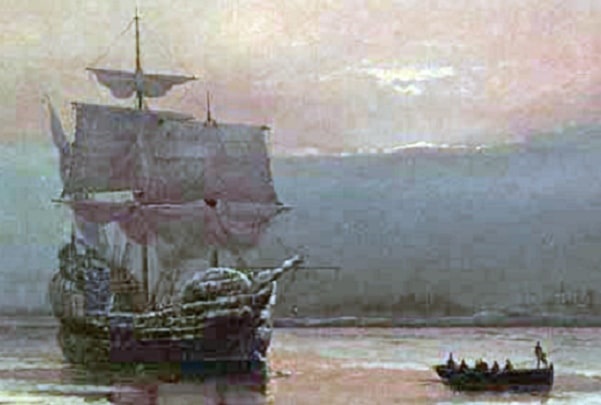Introduction: In this article, Melissa Davenport Berry gives the 10th part in her series on Mayflower descendants that focuses on Katie Crocker and her family line, again featuring an account book of the Crocker family which covers the years between 1790 and 1843. Melissa is a genealogist who has a blog, AnceStory Archives, and a Facebook group, New England Family Genealogy and History.
Today I continue my series on the Mayflower lines of Katie Crocker of Barnstable, Massachusetts, which include passengers John Howland, John Tilley, Edward Winslow, Henry Samson, Francis Cooke, Thomas Rogers, and Stephen Hopkins.
To recap: An account book (1790 through 1843) of the Crocker family contains both residents who descend from the Plymouth Pilgrims and those who married into the Mashpee Wampanoag Indian Tribe. My last story covered some of the historical connection to Mashpee Indian Tribes associated with the Crocker and allied families.
Here is a page from the account book, settling the estate of Katie’s 5th great grandfather Zenas Crocker, who died in 1807.

The Cahoon Museum in Cotuit, Massachusetts, has given me permission to share the account book’s pages and further research. You can view this book on Americana-Archives.org. So far, I covered Katie’s ancestors Richard Bourne, aka “the White Sachem,” or “Little Father,” a missionary that the town of Bourne is named for. Also, the Rev. Gideon Hawley, a minister appointed by the Mashpee Indian tribes. See: Mayflower Descendants: Who’s Who, Part 35 (part 9).
After Rev. Hawley came Rev. Phineas Fish (1785-1854), the great grandson of Katie’s 7th great grandparents Captain Nathaniel Fish and Mary Tobey.
Here is a silhouette of Phineas Fish signed by the artist, below the bust on the left, in ink: “Doyle.” To the right of the silhouette, written in pencil is: “Taken in Boston.”

Also in the collection is a Bible that belonged to the Fish family, with nine sheets of genealogical information pertaining to the following individuals and families:
- Francis Joy, David Gardner, Reverend Phineas Fish, William H. Fish, and Isaac Barker.
- Fish was the son of Jonathan Fish and Temperence Nye. He married Phebe Gardner, daughter of Gideon Gardner and Hepssbeth Joy, and descended from early settlers including Quakers Richard Gardner, Sarah Shattuck, Peter Folger, George Bunker, and Tristram Coffin.
- Fish shows up in the pages of the ledger settling the accounts of Katie’s ancestor Zenas Crocker, son of Ebenezer Crocker and Zerviah Winslow, and husband of Hannah Bourne.
- Also mentioned in the ledger book is Simeon Fish, appointed guardian to the Mashpee Indians, and three other Fish residents: Prince, Charles, and Jonah.
Here is a newspaper announcement of Rev. Fish’s new post.
This article reported:
On the 18th September was ordained at Mashpee, Rev. Phineas Fish. This settlement contains the remaining natives of Plymouth County, with such of European origin as have settled by permission among them. A charity intended for the natives is directed to this object. The charge includes the Herring Pond Indians. The mission began under the direction of the celebrated Eliot, called the Apostle of the Indians, and has been honored by the affectionate and useful services of the late Mr. Hawley. The charity is in trust with the University of Cambridge, and the president of the establishment preached on the occasion.
There is a memorial to John Eliot, the “Apostle Memorial” aka “Eliot Terrace” (1879), located in Newton, Massachusetts. Eliot was the first missionary to produce religious text for Algonquians in their own language. The memorial contains a plaque with his name, in addition to an inscription that reads:
Here at Nonantum, October 28, 1646, in Waban’s wigwam, near this spot, John Eliot began to preach the Gospel to the Indians. Here was founded the first Christian community of Indians within the English colonies.
The “Apostle,” Rev. John Eliot (1609-1690), was a missionary to the Indians and Roxbury Latin School founder. He published the “Mamusse Wunneetupanatamwe Up-Biblum God,” or the “Eliot Indian Bible” (1663), the first Bible printed in British North America. He married Hannah Mumford and his descendants became one branch of the Boston Brahmin family.
Found in several pages of the Crocker account book is Deacon Isaac Coombs (1774-1848), son of Joshua and Patience Coombs. He married Lydia Moses, daughter of Revolutionary War soldier Samuel Moses and his wife Hosea Webquish. Samuel and Hosea were married by Rev. Gideon Hawley in 1770.
Here is a photo of page 71 of the account book, showing entries for Isaac Coombs for 25 March 1799, along with a transcription.
Isaac Coombs was a deacon in Phineas Fish’s congregation. He also served as a selectman in the town of Mashpee. He appears on the 1835 list of voters in Mashpee with other relatives. More on the Coombs family line coming in the next story.
To be continued…
Explore over 330 years of newspapers and historical records in GenealogyBank. Discover your family story! Start a 7-Day Free Trial
Note on the header image: “Mayflower in Plymouth Harbor,” by William Halsall, 1882. Credit: Wikimedia Commons.
Other Sources:
Related Articles:
- Mayflower Descendants: Who’s Who, Part 35 (part 1)
- Mayflower Descendants: Who’s Who, Part 35 (part 2)
- Mayflower Descendants: Who’s Who, Part 35 (part 3)
- Mayflower Descendants: Who’s Who, Part 35 (part 4)
- Mayflower Descendants: Who’s Who, Part 35 (part 5)
- Mayflower Descendants: Who’s Who, Part 35 (part 6)
- Mayflower Descendants: Who’s Who, Part 35 (part 7)
- Mayflower Descendants: Who’s Who, Part 35 (part 8)
- Mayflower Descendants: Who’s Who, Part 35 (part 9)
